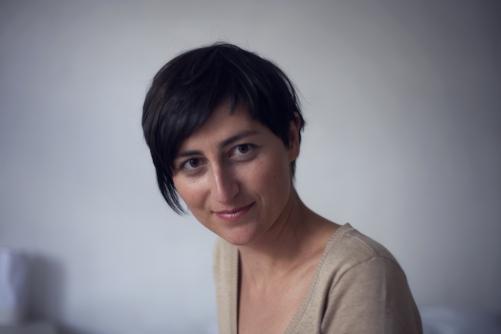Although Sandig was born in former East Germany, one would not necessarily recognise that immediately from any outward aspect of her poetry. Rather it is present in occasional turns of phrase, and perhaps in a residue of longing for a disappeared world. On the one hand, her poetry deals in the recognisably real: from the city or landscapes of the south to the minutiae of the everyday. But hers is also a voice tinged with nostalgia and a sensibility for landscape that harks back to models from the past, a compass needle finely tuned to an existential north that is overshadowed by absence and loss. Her language reflects this dichotomy: splicing contemporary slang with snippets of children’s rhymes, fairy-tales, or quotations from a nineteenth-century canon with a telling irony. Hers is a quiet voice in many ways: without showy metaphors or obtrusive forms, but with a profound sense of music, as demonstrated by the fact that some of her poems appear with musical settings on her recent CD with musician Marlen Pelny Märzwald (March World, 2011). Dickicht (2011) takes us into a “thicket” that is at once the world, the psyche, and language itself. The poems explore language at its most slippery (testing out idioms, playing with the lack of upper case to exploit multiple meanings, riffing on the formal and intimate second person address). Many poems appear in opposing pairs and insist on the mutability of what appears to be stable polarities. And if the poems always seem to go in search of a self, a home, they are also simultaneously and teasingly aware that, as Sandig put it in a recent interview, “at its best a poetry collection becomes the place where you yourself can disappear.”
***
but i won’t say a thing about the way the trees
tremble in the light, nor about the trees themselves.
not a word about the beech at the doctor’s place
while her daughter is dying upstairs, not a word
about the foxglove tree in the backyard, where
you and I sit ’til late every night and act like
the doctor’s daughter is real only in the poems
i write. of the trembling of the trees in the light
i will give nothing away but the very tips,
the tips of the trees that sway in the wind and
the branches of needles always green. i will
act like only that flickering, fevered light
embroidered into the tips of the fir trees is real.
but not their trunks crowding beneath, never
those slender shadows, the forest, the trees themselves.
*
from the plane you see
the smart bluescreens of pools by day
in a thousand and one gardens at home
all manner of squares the less distance
you and I roam from Germany. look
by night the bloodorange avenues of lights
of those persian cuban (where are we?)
cities! down below the highways shine
up here it’s us that shine. the night arrives
we’re making strides – if it’s here you have
your child, what will you call it? call it
ASIA, call it ALMUT, call it ALPHA, let’s give
OMEGA a miss. we come from somewhere
we sleep, we’re en route for nowhere at all.
*
now that I’m gone, everything comes easy.
wednesday someone buys eggs, thursday they
go to catch fish. friday there’s a power cut, later
on the dot the alarm is set. oh yes. no one says
‘sat’day’, except for me, and I am not there.
one day someone misses me, then buys himself
a treat. everything comes easy. each creature
tucked in at night. me apart. but that comes –
*
first she took him by the hands
then she left him by the ferns
in the furthest part of the forest
alone. time passed in an instant
between the birches the heat flared
then night fell hard one more time
birds swivelled their heads to face him
slowly two-hundred and seventy degrees
but he had not marked his way back
to the glittering cities of central Europe
with a single crumb of bread.
mushrooms sprouting round his feet
the feel of fur brushing past him
out of nowhere, front and behind
shadows, above him trees creaked
the southern sky kept on turning
and kept on turning in circles or
had he just heard that said or
read it in the books of his friends?
what had gone wrong? had it gone wrong?
***
Read the poems in their original German here, and listen to the author read her work here.
***
Ulrike Almut Sandig was born in 1979 in Großenhain, Saxony, and now lives in Berlin. In 2005 she completed a degree in theology and modern indology and in 2010 she graduated from the German Literary Institute in Leipzig. Alongside various editorial activities, she has published three volumes of poetry—Zunder (2005/2009), Streumen (2007), and Dickicht (2011)—and Flamingos (2010), a collection of short stories, as well as radio plays. She has been granted residencies in Helsinki and Sydney and won numerous prizes, including the prestigious Leonce-und-Lena Prize (2009) and, most recently, the Droste Award for Emerging Talent (2012).
Karen Leeder is an academic and writer. Her translations of German poetry have appeared in a variety of journals including Poetry Review, PN Review, Domus (Italy) and MPT. Her volume of Evelyn Schlag’s Selected Poems with Carcanet in 2004 won the Schlegel-Tieck Prize in 2005, and her translations of Durs Grünbein’s “Childhood in the Diorama” won the Times Stephen Spender prize in 2013. Her translations of Sandig poems have appeared in MPT (UK) and SPORT (New Zealand) and she received a Deutsche Übersetzerfonds award in 2014. She will translate Sandig’s Flamingos for Liverpool University Press in 2015.
***
Published with permission from: Ulrike Almut Sandig, Dickicht. Gedichte. © Schöffling & Co. Verlagsbuchhandlung GmbH, Frankfurt am Main 2011.

